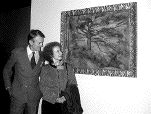
From
the |
||||
| The great ones are always unflappable Margaret Atwood discusses Canada's 'strange' literary past |
||||
| Sharon
Dunn, National Post |
||||
I'd heard through various grapevines that she can be tough and cold, but
nothing could be further from the truth -- even as I persisted in following
her around as "we" viewed the art. She even humoured me by posing
with an oil she particularly admired, titled Large Pine near Aix-en-Provence.
"I'm pretty fond of Cézanne," she explained, "because
for nine years I lived in the region where he was painting."
More to the point, she's also fond of a new book in which she had a hand.
It's Ground Works, published by Anansi Press, the amazing Canadian house
where she cut her literary teeth way back when, and edited by Toronto poet
Christian Bok. It is a collection of experimental fiction, written between
1965 and 1985, and includes work by such luminaries (now they're luminaries,
then they were just getting started) as Michael Ondaatje, Leonard Cohen,
Graeme Gibson and Matt Cohen.
In her introduction, Atwood wonders why '60s Canada was such a fertile ground
for interesting writing, then offers her theory: "Partly because it
was a stranger place in many ways than is often supposed -- who remembers
the LSD that flowed so freely in London, Ont., in the 1950s -- well before
the age of Timothy Leary -- not to mention the orgies in the cathedral?
It was strange in a literary way as well. What other country would have
produced a set of Spenserian eclogues spoken in a farmyard by a flock of
geese?" (That appeared in A Suit of Nettles, written by James Reaney
in 1958.)
"I was never a radical," Atwood told me, "and now I'm too
old to be a hippie. The book is not about radicalism," she added. "It's
about conservatism gone astray."
It's clear in her introduction that she harbours great affection for those
days, and she gave me permission to quote a representative chunk from the
introduction:
"Many but not all of the writers sampled here [in Ground Works] were
also poets. The overlaps -- poets publishing poets in presses devoted to
poetry -- were considerable. Michael Ondaatje was for years a member of
the Coach House collective; I myself worked as an editor with House of Anansi
Press. Andreas Schroeder worked with Sono Nis, George Bowering was associated
with Tish; and these are just a few examples.
"This scene was not idyllic. In my own experience, small-press publishing
was a hotbed of jealousy and intrigue and puddles of blood on the floor,
second only to Rome under Caligula. Coach House Press got around this in
the early days by consuming large amounts of mellowing substances - 'Printed
in Canada by mindless acid freaks,' read their logo, right alongside 'Copyright
is obsolete'; -- but at House of Anansi it was not so much drugs as drinking,
and no one got out of it without a knife between their shoulder blades.
No one but a lunatic, or someone brainwashed by the Girl Guides into thinking
she had to do Good Deeds For Others, would have stayed in this situation
for long. Which was I? A little of both. But that's another story."
Before leaving Atwood, I mentioned to her that her book, Bear, had a big
impact on me many years ago.
"Actually, I didn't write that, Marian Engel did."
I blushed. She laughed.
My horrendous gaffe didn't offend her a bit. That's what it's like when
you're the best in the world; unflappable.
As for me, well, that's another story. |
||||
| Last
update:
May 6, 2009
© Copyright 2009, National Post Email: Sharon Dunn Email: Webmaster |
||||
